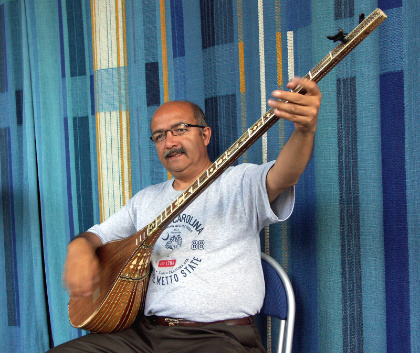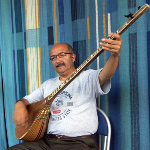
Songs
- 1 Ärkäk Su
- 2 Ämäldar
- 3 Nimä
- 4 Turmush
- 5 Häykäl
- 6 Häsätxor
- 7 Saxta Adash
- 8 Bändä
- 9 It Mijäzlär
- 10 Sal Näzär
- artist:Kurash Sultan
- region:Uyghur
- country:China
- formats:Audio File / Digital
- record posted by:Svenskt visarkiv
Links
This CD project is the third of four audio compilations created in the framework of DISMARC (Discovering Music Archives), co-funded by the European Commission. The project consists of 12 songs, several photos and a detailed booklet.
The Swedish town of Eskilstuna can be found on the Uyghur map. The contemporary Uyghur map is a world atlas. In his songs and poems, Kurash Sultan (1959-2006) explored this transterritorial Uyghur world, making an essential contribution to its mindscape.
In the last days of 1999 he arrived in Eskilstuna after a long and adventurous odyssey, bringing his dutar and other stringed instruments, all vehicles of identity and belonging. Eskilstuna became a haven for his creativity. Here he set out on a grandiose undertaking, aiming at collecting, publishing and recording the Uyghur cultural heritage. This project unfortunately was left unfinished with Sultan’s premature death of a heart attack in 2006. Early in 2008 Sultan’s collections, manuscripts and recordings were donated to the Svenskt visarkiv (The Swedish Centre for Folk music and Jazz research). On this CD we present a representative selection of his accomplishments.
So, who are the Uyghurs and what is ‘Uyghur-ness’? As is always the case with collective identities, there are multiple answers and differing points of view. In the here-and-now, humans have a need for clear-cut identity markers and emblems, which can provide answers to the ever-occurring questions “who are we?” and “who are the others”? Then there is the historical perspective, linking the present to the deeds and creations of long vanished generations of forefathers and foremothers. History suggests an explanation of the present. It answers the question “why?”. We are what we are and we do what we do because we feel that we are fulfilling the dreams and longings of the ancestors. We trace their footsteps backwards as we take our course towards the future. We talk about heritage.
Kurash Sultan (mainly known among the Uyghurs under his artist name of Kurash Kösen) was a singer and multi-instrumentalist with a thorough musical education from the Xinjiang Art Institute in Urumqi, the capital of Xinjiang-Uyghur. These studies embraced the Muqam, the classical art music of the region, as well as Uyghur folk music and Western music theory. Chinese music also was part of the curriculum. The commencement of Sultan’s music studies in 1979 coincided with a “liberal” turn in Chinese ethnic and linguistic policies. After the oppressive confusion of Mao’s Cultural Revolution, cultural pluralism was tolerated and even encouraged during the 1980s, and the Uyghur cultural movement gained momentum. Kurash Sultan’s multifaceted talent soon gave him an acknowledged position as an artist and pedagogue. Around 1990, he also studied literature at the Xinjiang University. As a singer/songwriter he toured the province with his ensemble, and he became the popular winner of several music competitions.
However, it was exactly this markedly Uyghur activity that was to cause the dissatisfaction of the Chinese administration, which had encouraged the Han Chinese colonisation of the province. The economic and ideological liberalisation of the 1990s had no equivalent in ethnic policies. On the contrary, a suspicious and vigilant attitude towards the cultural expressions of the national minorities became manifested. In 1993 Sultan was expelled from the Xinjiang Art Institute. His passport was confiscated, he was constantly monitored and his future in China looked very bleak. Forbidden to perform in public, he was forced to survive on different temporary jobs. In 1996 he decided to escape, hoping to be able to carry on his artistic work in the neighbouring Central Asian states where there are considerable Uyghur minorities. However, his continuing activities abroad were apparently a thorn in the side of the Chinese regime, which pressured the authorities in Kirgizstan to imprison him for nine months without trial, under harsh and humiliating conditions. When at last he was released in 1999 after a UN intervention, he applied for political asylum in Sweden.
Waiting for the decision of the Swedish authorities, he was assigned a job in a café in Eskilstuna, about 120 kilometres west of Stockholm. There he happened to meet Mr Jonas Burman, a musician and local cultural administrator who soon realised Sultan’s artistic capacities. This led to a fruitful cooperation, which was to place Eskilstuna on the world map of the Uyghur Diaspora. As an artist in residence at the Cultural centre of Eskilstuna, Sultan gathered, organised and recorded his personal and Uyghur collections. He also collaborated on-stage with numerous Swedish folk and world music artists and made several radio and TV live performances. He was one of the pillars of the Swedish Uyghur Committee and the founder and editor of the Uyghur-language periodical Gherp Shamili, which was published in Eskilstuna. Even if his ambitious documentation project was unfortunately left as an unfinished body of work with his untimely death, the Svenskt visarkiv is very happy to have received the donation, and we whish to express our gratitude to Mrs Bahtigul Sultan, whose decision it was to hand over these cultural treasures to our institution.
Through the DISMARC project, in which Svenskt visarkiv (SVA) participated, the donation became internationally known, which resulted in the invitation to produce this CD. However, the music presented on the CD represents only a fraction of the Kurash Sultan donation, which contains Sultan’s manuscripts and much background material in printed and digital formats, as well as his musical instruments (these are kept at the Stockholm Music Museum). After its subsequent cataloguing in the SVA database, the content of the donation will be made accessible to ethnomusicologists and musicians worldwide by way of the DISMARC search portal. The Sultan donation exemplifies the rich collections of non-European music that is to be found in many European archives as a consequence of, either earlier colonial relationships, or of the more recent migration and globalisation processes.
Since its creation in 1951, the Svenskt visarkiv (The Centre for Swedish Folk Music and Jazz Research) has had a commission to document, collect, maintain and keep alive musical heritage, and thereby enhance the interest in music, musicology, and the long-term accumulation of knowledge about music. Together with the Stockholm Music Museum and the Music Library of Sweden, the SVA constitutes The Swedish National Collections of Music. See also www.visarkiv.se.
Complete tracklist
1. Ärkäk Su - 3’29’’
2. Ämäldar - 2’54’’
3. Nimä - 5’19’’
4. Turmush - 2’41’’
5. Häykäl - 4’45’’
6. Häsätxor - 4’16’’
7. Saxta Adash - 5’04’’
8. Bändä - 3’47’’
9. It Mijäzlär - 4’43’’
10. Sal Näzär - 4’28’’
11. Yärni Satmanglar - 5’28’’
12. Hawada - 8’07’’
Nos. 1-11 lyrics & music by Kurash Sultan
No 12 traditional
Nos. 1-11 recorded in 2006 by Kurash Sultan, at the Cultural Centre of Eskilstuna, Sweden. © Svenskt visarkiv.
No 12 recorded in 2002 at Studio “Lök”, Eskilstuna, by József Szimó, Fortissimo CD-produktion (reproduced with permission from József Szimó).
Research and CD production: Anders Hammarlund, Svenskt visarkiv
Translations from Uyghur: Patrick Hällzon ©
Booklet photos: Roger Pedersen ©
CD mastering by Claes Persson, CRP Recording











